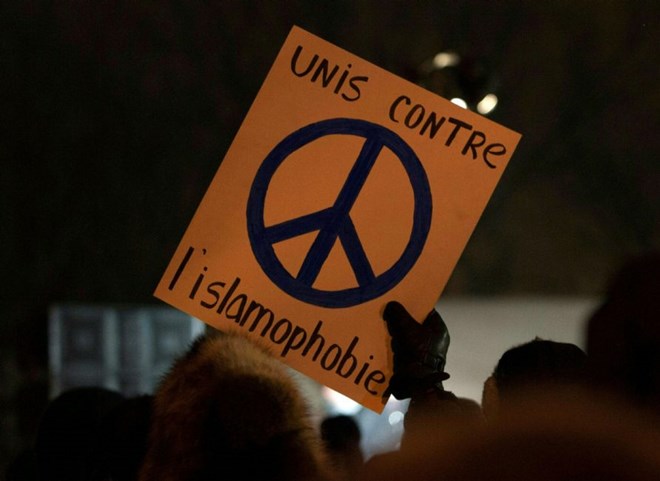
Monday January 29, 2018

As Quebecers prepare to mark the first anniversary of the attack that killed six men, some Muslim community leaders and experts say an initial outpouring of sympathy and support from the broader community was short-lived.
Brian Semple never leaves his Quebec City home to pray at the mosque without his cellphone anymore.
Before, the tour guide and hospital orderly said, there was a risk — a risk that he would forget to silence the device, that it would ring out in the middle of prayers.
Now, one year after the shooting that killed six men and injured five others at the Grande mosquée de Québec, Semple says the perceived risk is much greater.
Four days of commemorative events, leading up to a vigil on Monday expected to include Prime Minister Justin Trudeau, were scheduled to highlight the bridges that have been built since a gunman stormed the mosque and opened fire on an unsuspecting crowd during Sunday evening prayers.
Maryam Bessiri, a member of the organizing committee, said the events were an attempt to “consolidate” the advances that have been made in the past year.
But one year on, there are troubling signs. Community members say that the initial reaction of Quebecers and Canadians — a very public display of sympathy and tolerance toward the Muslim community — has not endured.
“Are we stronger or weaker? I think we are more aware of the existence of certain problems,” Bessiri said. “It’s the awareness that there are certain problems that, even with the best values we have, must be dealt with and given attention — among other things, the problems of racism and Islamophobia.”
Semple, a Muslim convert, said his Moroccan-born wife endured insults before the shooting because she wears a hijab.
“Just after (the attack), there was a great outpouring of sympathy and empathy. We’d get on the bus and people would smile and be friendly. That fizzled out and it sort of went back to the same,” he said. “It took, perhaps, a couple of months.”
Stéphane Leman-Langlois, a professor of criminology at Université Laval in Quebec City, said there were two broad types of reaction to the mosque shooting.
The first included those shocked by the deadly violence who expressed their solidarity with Muslims in Quebec. They were people like Annie Demers-Caron, a local junior college teacher who organized Lettre à toi, a letter-writing campaign in which people from across the province wrote messages of solidarity that were bound into a book and presented to the families of those killed.
The second type included those who felt emboldened in expressing their anti-Muslim and anti-immigration views while denouncing the act of violence.
“They came forward saying, ‘We’re not extremists because we didn’t do this,’” Leman-Langlois said. “It was like they were saying, ‘Here is an example of an extremist. We disapprove of this act … so we’re legitimate.’”
Leman-Langlois includes in this group Quebec City’s provocative talk radio hosts, who were blamed in the wake of the shooting for stoking the fires of intolerance, as well as nationalist or right-wing groups such as La Meute, which was founded in 2015 with the stated mission to combat radical Islam.
A number of La Meute members were reportedly part of the committee that waged a political battle in the wake of the attack to block the creation of a dedicated Muslim cemetery in the town of St-Apollinaire, near Quebec City.
When the cemetery project was blocked in a municipal referendum, Quebec Mayor Régis Labeaume then sold city-owned land to the Centre culturel islamique de Québec. This, he said, would allow the community to bury its dead close to home rather than seeking out space at a Muslim plot near Montreal, or sending the remains back for burial in the Middle East or Africa, as was done for those killed in the mosque attack.
Two days after the sale of land, a parked car belonging to the group’s president, Mohamed Labidi, was set ablaze, leading to criminal arson charges against two men who had no known connection to any organized group.
Sylvain Brouillette, a La Meute spokesperson, said in an interview that his group supports the decision to commemorate the “six innocent Quebecers” killed in the mosque shooting, but urged members attending the vigil not to identify themselves as La Meute supporters out of respect for the grieving families.
He also condemned governments and “the political movements of religious minorities” that, he said, have used the mosque attack to score political points.
One such initiative is the push by the National Council of Canadian Muslims to have Jan. 29 marked as a day against Islamophobia. While there has been no national decree, some cities across Canada have taken up the suggestion, which has been rejected by Quebec Premier Philippe Couillard.
“We think it’s an insult against the (Quebec) nation,” La Meute’s Brouillette said. “We don’t believe that Québécois are an Islamophobic people. We don’t believe that Québécois are racist.”
Quebec City police said last week that the number of hate crimes against Muslims doubled in 2017 to 42, from 21 in 2016. It is a troubling rise in a city that takes pride in its low crime rates.
But it isn’t a surprise to Demers-Caron, who is also organizing Monday’s commemoration. She said an intolerant atmosphere in Quebec City is having an impact on the morale of a Muslim community struggling to recover from the tragedy.
“It’s like the solidarity is not enough because the far right is too strong,” she said. “That’s what I feel and I see. I would have expected them to go quiet. We’ve just had six men killed. There are 17 children who’ve lost a father. We would have expected that it would be a bit more uncomfortable for them to express their racism. But it’s the opposite.”